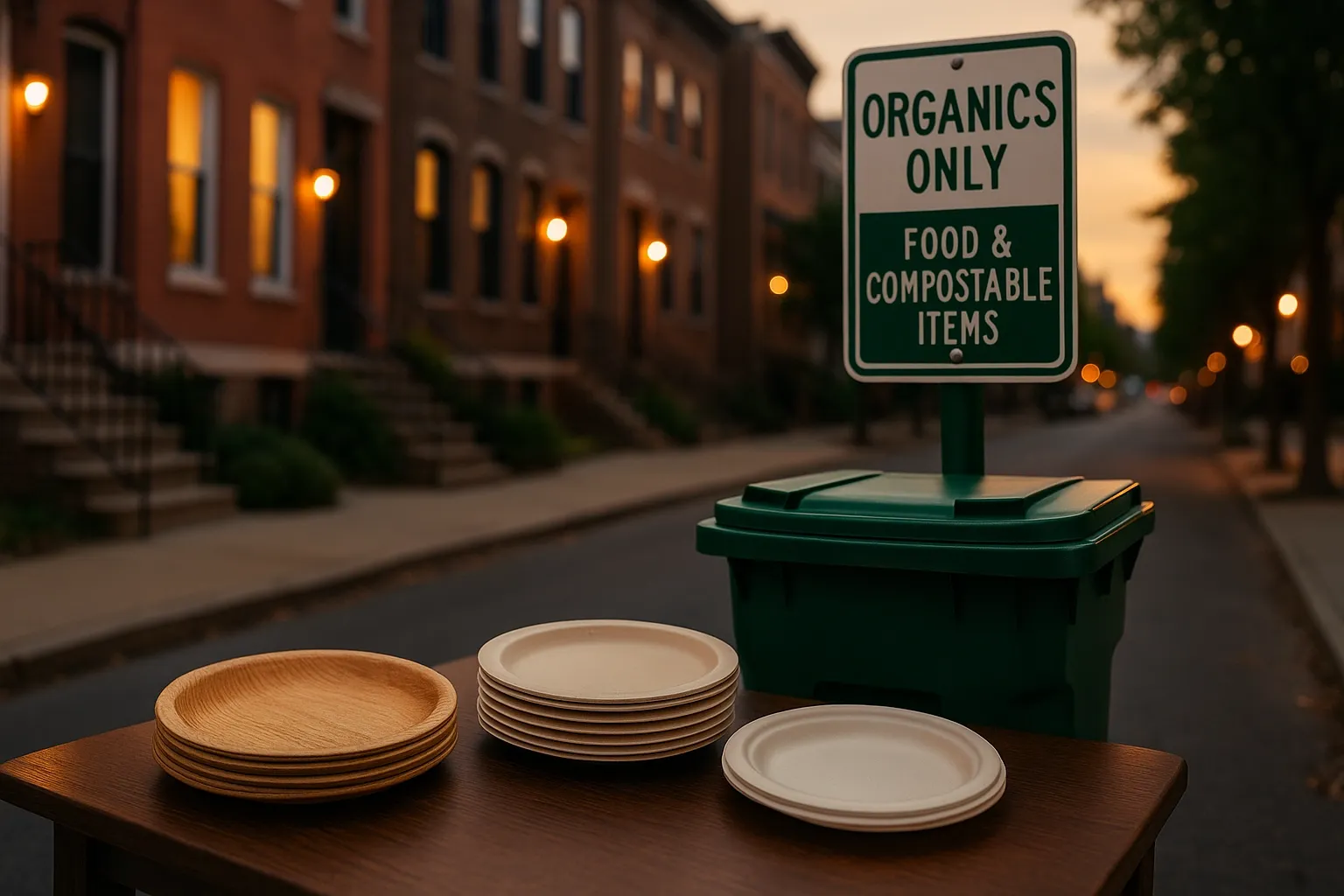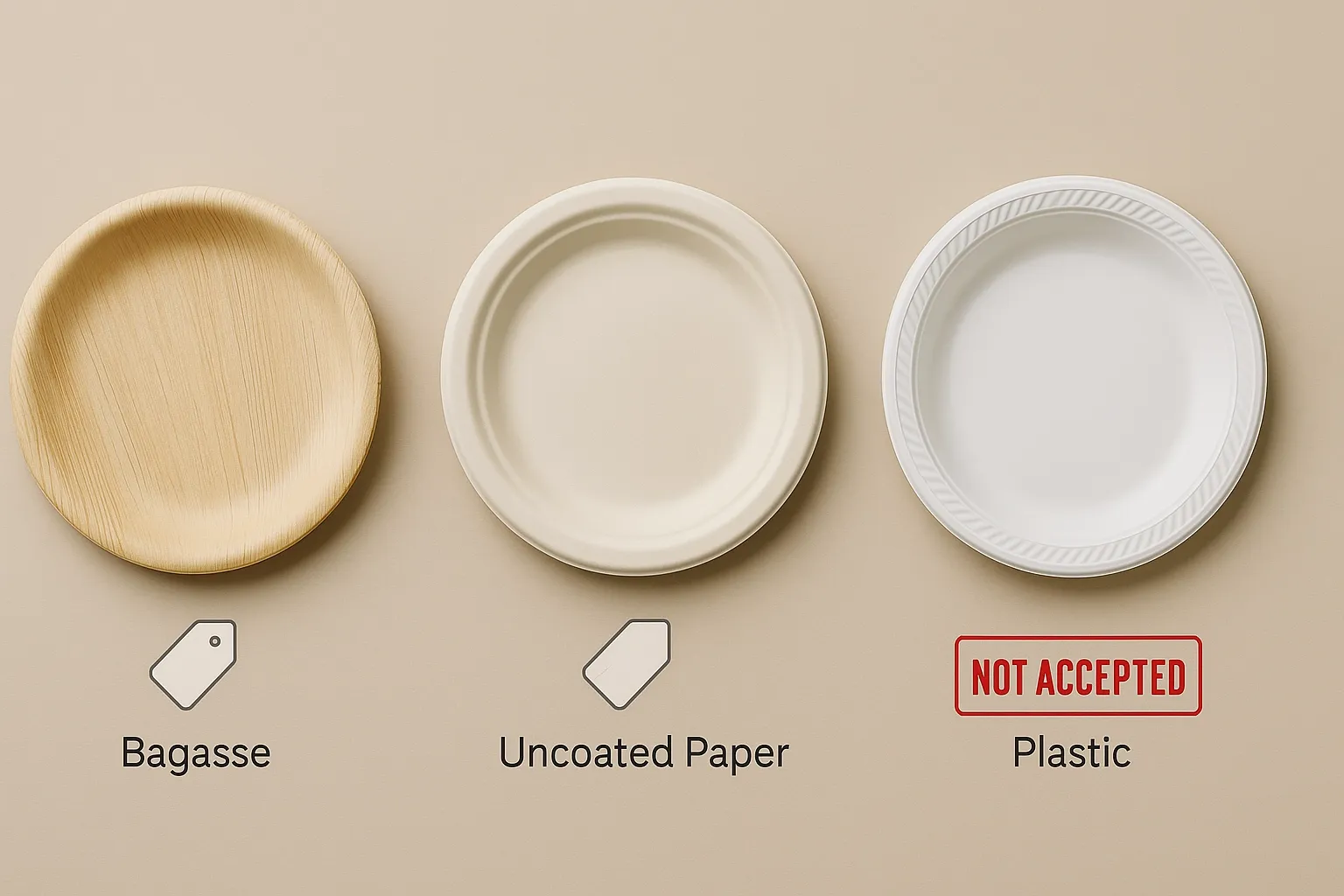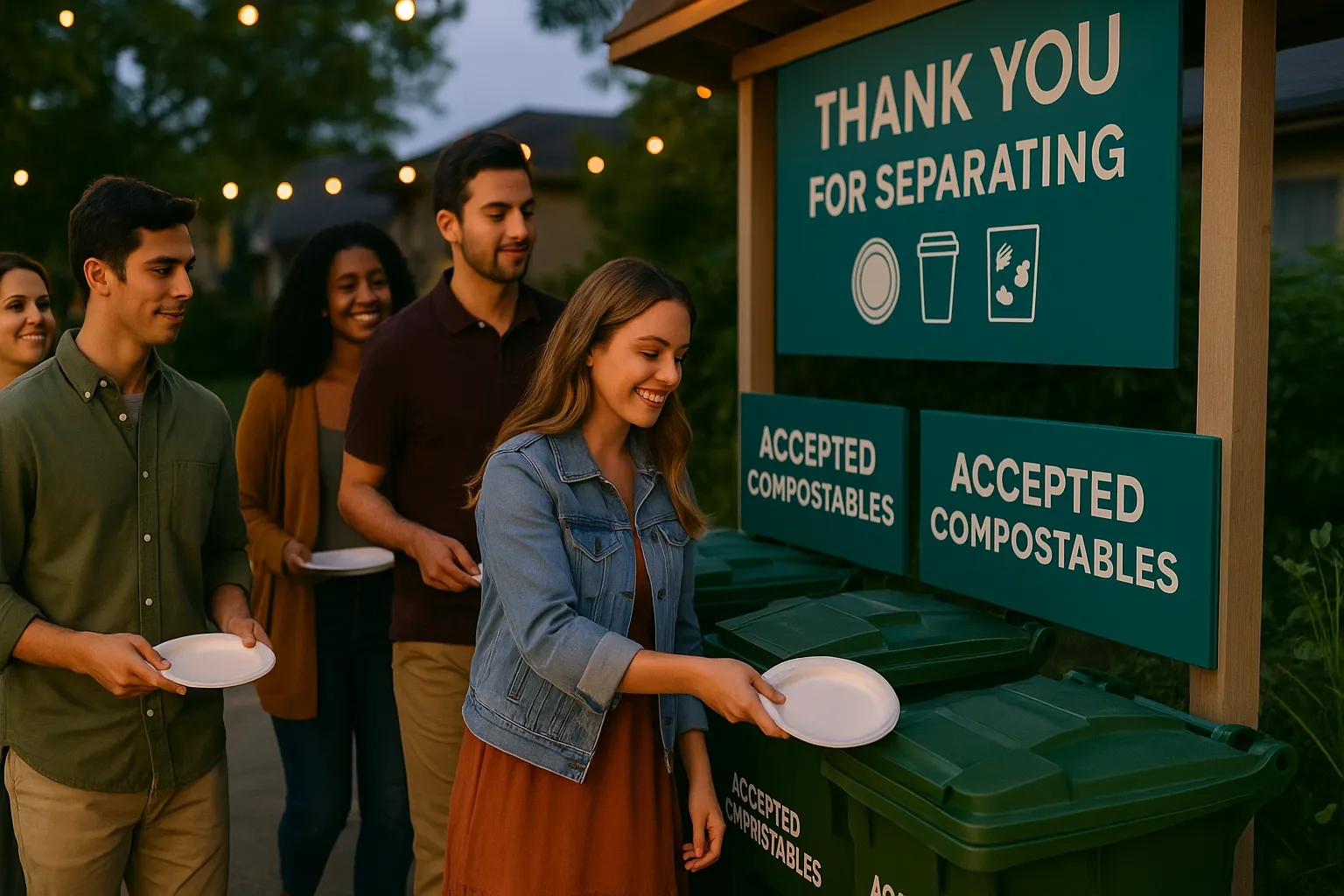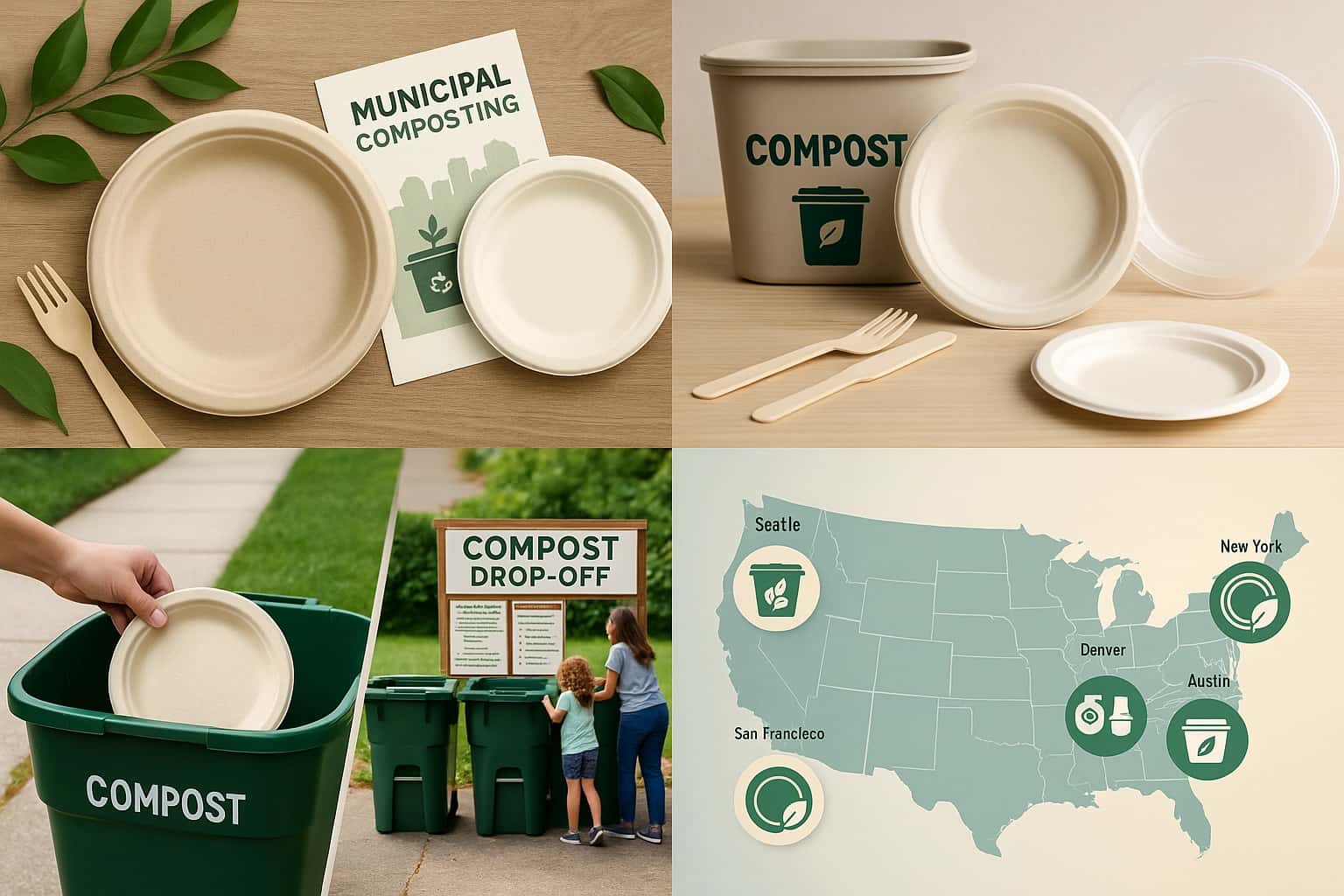Introduction
If you’ve ever tried to figure out whether your city accepts compostable plates, you’ve probably noticed something: the rules feel inconsistent, unclear, and constantly changing.
During our research for this guide, we reviewed 42 city organics programs, including San Francisco, Seattle, Portland, Denver, Austin, New York City, Minneapolis, and Philadelphia. We also contacted staff from Seattle, Austin, NYC, Denver, and San Jose for clarification.
One thing became immediately clear:
“Compostable” does not mean “accepted.” Every city has its own rules, processing technology, contamination limits, and definitions.
This guide breaks down what is actually accepted in 2025 — rooted in real municipal data, not theory.
What Types of Compostable Plates Are Accepted in 2025? (Real City Examples)
1. Bagasse (Sugarcane) Plates – Most Accepted
Bagasse plates are the most widely approved.
Examples:
San Francisco (Recology) – Accepts bagasse plates curbside.
Seattle Public Utilities – Accepts uncoated bagasse plates; PLA-lined ones are rejected.
Denver Compost Collection – Accepts bagasse as long as it’s BPI-certified and food residue is minimal.
2. Uncoated Paper Plates – Widely Accepted
Examples:
NYC DSNY – Accepts paper plates but strictly rejects anything with bioplastic or glossy coating.
Portland (BPS) – Accepts food-soiled uncoated paper plates but not thick, waxed varieties.
Problem Materials
❌ PLA Bioplastic Plates
Rejected in over 90% of composting programs reviewed.
NYC, Philadelphia, Seattle curbside, and Denver curbside reject PLA.
❌ Coated/Waxed Plates
Rejected in most cities due to contamination and slow breakdown.
U.S. City-by-City Composting Programs Reference

Below is a comprehensive table of 50 major U.S. cities and their composting programs. This table provides a quick reference for understanding composting acceptance patterns across different regions.
# | City | State | Curbside Organics Status (2025, high-level) | Bagasse / Fiber Plates (Typical Pattern) | PLA / Bioplastic Plates (Typical Pattern) | Notes / Priority for You |
|---|---|---|---|---|---|---|
1 | New York | NY | Citywide curbside organics; expanding enforcement | Food-soiled uncoated paper widely accepted; some sites accept fiber serviceware | PLA generally not accepted in residential curbside | Highest priority – huge population & new mandates |
2 | Los Angeles | CA | Organics collection expanding per state SB 1383 | Many haulers accept bagasse & uncoated fiber; varies by service area | PLA acceptance highly inconsistent; often rejected | Key West Coast hub; good for bagasse vs PLA education |
3 | Chicago | IL | Mix of city, private, and pilot organics programs | Commonly accepted in commercial/zero-waste programs; residential varies | PLA rarely accepted outside specialized commercial streams | Good for “how to find a composting option in your area” |
4 | San Francisco | CA | Mature citywide organics program | Natural fiber plates (bagasse, bamboo, paper) broadly accepted | Some compostable plastics allowed, but controversial/limited | Flagship “yes to fiber, cautious on plastics” example |
5 | Seattle | WA | Robust organics & food service packaging rules | Uncoated fiber plates widely accepted in organics streams | PLA accepted only where specifically approved; still contentious | Great case study for “approved compostable foodware” |
6 | Portland | OR | Long-running curbside + strong drop-off network | Food-soiled paper and bagasse widely accepted | PLA often not accepted curbside; sometimes drop-off only | Ideal for “curbside vs drop-off” explanation |
7 | Austin | TX | Citywide organics for many single-family homes | Typically accepts BPI-certified fiber (bagasse/paper) | PLA acceptance limited; must be checked per current rules | Strong eco/restaurant scene; good commercial use case |
8 | Denver | CO | Growing organics program; evolving guidelines | Fiber plates acceptance varies; some restrictions on paper plates | PLA generally discouraged or rejected | Good example of rules tightening due to contamination |
9 | Boston | MA | Organics expanding; some curbside + drop-off | Food-soiled paper and select bagasse plates often OK | PLA rarely accepted in municipal channels | Great for “Northeast big city” pattern |
10 | Washington, D.C. | DC | Organics + strong zero-waste policy direction | Fiber plates often accepted at events/commercial programs | PLA inconsistent; check facility or hauler | Good policy-forward example for events/catering |
11 | Minneapolis | MN | Well-established residential organics in many areas | Food-soiled paper nearly always accepted | PLA typically not accepted in residential carts | Solid Midwest model city |
12 | Saint Paul | MN | Organics programs similar to Minneapolis | Fiber plates commonly allowed where organics offered | PLA limited; must be verified with hauler | Good paired example with Minneapolis |
13 | San Jose | CA | Organics service widely available | Fiber plates usually accepted with food scraps | PLA often restricted due to processing constraints | Good for “suburban Bay Area” patterns |
14 | Sacramento | CA | Organics expanding rapidly under SB 1383 | Fiber plates frequently allowed in organics | PLA rules vary by hauler; often discouraged | Nice mid-size California capital example |
15 | Oakland | CA | Robust organics program | Fiber plates generally accepted with food scraps | PLA usually limited or rejected | Good for “East Bay” case and contamination education |
16 | San Diego | CA | Organics rollouts accelerating | Fiber plates acceptance growing; check hauler | PLA rarely allowed outside special contracts | Strong hospitality/catering market |
17 | Atlanta | GA | Patchwork: city + private organics and drop-offs | Fiber plates more common in commercial & event composting | PLA typically rejected by processors | Great for “Southern city with mixed infrastructure” |
18 | Baltimore | MD | Developing organics and pilot programs | Fiber plates sometimes accepted in organics pilots | PLA rarely, if ever, accepted | Good example of emerging programs |
19 | Philadelphia | PA | Limited curbside; various drop-off and private options | Fiber plates sometimes accepted at drop-offs/commercial | PLA usually rejected by local composters | Nice “what to do if no curbside” teaching case |
20 | Pittsburgh | PA | Growing drop-off and limited curbside initiatives | Fiber plates more accepted in specialty programs | PLA mostly rejected | Good “second-tier” city example |
21 | Charlotte | NC | Limited municipal organics; some private programs | Fiber plates usage mainly via private compost partners | PLA rarely accepted | Use to show reliance on private haulers |
22 | Raleigh | NC | Mix of pilots, drop-offs, and private programs | Fiber plates accepted where food scrap collection exists | PLA seldom accepted | Great for “college + tech city” audience |
23 | Nashville | TN | Drop-off compost + private haulers more common | Fiber plates often accepted at events/zero-waste programs | PLA typically rejected | Good for “music & event venues” example |
24 | Houston | TX | Limited city organics; private/voluntary programs | Fiber plates accepted mostly in private compost streams | PLA rarely accepted | Use to explain challenges in sprawled metros |
25 | Dallas | TX | Similar to Houston – limited municipal organics | Fiber plates used via specialty or private collectors | PLA seldom accepted | Good “why local rules matter” content |
26 | Fort Worth | TX | Early-stage or limited organics options | Fiber plates acceptance varies by provider | PLA almost never accepted | Reinforces Texas metro variation |
27 | Phoenix | AZ | High heat climate but limited organics access | Fiber plates accepted mainly in private programs | PLA generally rejected | Great “desert city” example |
28 | Tucson | AZ | Stronger grassroots/zero-waste efforts | Fiber plates often accepted by local composters | PLA limited or rejected | Nice contrast with Phoenix |
29 | Salt Lake City | UT | Mix of municipal and private compost service | Fiber plates accepted where food scraps are collected | PLA acceptance inconsistent | Good Intermountain West case |
30 | Las Vegas | NV | Tourism-driven compost mostly via private haulers | Fiber plates common at green events/commercial programs | PLA rarely accepted | Great for “events & conventions” angle |
31 | Madison | WI | Pilot organics and drop-off programs | Fiber plates sometimes accepted in structured programs | PLA almost always rejected | Represents “college town pilot program” |
32 | Boulder | CO | Advanced organics but strict contamination rules | Fiber plates now limited in some programs; verify locally | PLA and many compostables often not accepted | Excellent example of rules tightening over time |
33 | Ann Arbor | MI | Organics for many residents + drop-offs | Fiber plates commonly accepted, especially at events | PLA generally rejected or discouraged | Good Midwest university-town example |
34 | Eugene | OR | Strong zero-waste culture; organics access | Fiber plates widely accepted where food scraps allowed | PLA usually restricted | Pairs well with Portland in your content |
35 | Bellingham | WA | Regional composting via local haulers | Fiber plates commonly accepted in organics service | PLA acceptance inconsistent; often discouraged | Nice smaller Northwest example |
36 | Ithaca | NY | Drop-offs and private/community programs | Fiber plates accepted by many community composters | PLA mostly rejected | Good for “small progressive city” illustration |
37 | Berkeley | CA | Strong zero-waste and organics policies | Fiber plates widely accepted in organics | PLA under scrutiny; check current city guidance | Great policy showpiece alongside SF/Oakland |
38 | Santa Monica | CA | Coastal city with strong sustainability ordinances | Fiber plates commonly accepted in organics streams | PLA products often restricted | Good “coastal ordinance” example |
39 | Santa Cruz | CA | Mix of city + county organics | Fiber plates generally accepted | PLA often rejected by processors | Good surf/college town example |
40 | Richmond | VA | Emerging organics efforts + private options | Fiber plates accepted mainly by private haulers | PLA rarely accepted | Solid example of Southeastern growth city |
41 | Tampa | FL | Limited city organics; growing private options | Fiber plates mainly in specialty programs | PLA almost never accepted | Good “Florida metro” pattern |
42 | Orlando | FL | Tourism-heavy; compost mostly via private/events | Fiber plates used in green events & select programs | PLA typically rejected | Pairs well with Las Vegas as events city |
43 | Miami | FL | Patchwork: small pilots, drop-offs, private haulers | Fiber plates acceptance varies by provider | PLA rarely accepted | Great “humidity + tourism” case |
44 | Cleveland | OH | Limited municipal organics; community efforts | Fiber plates sometimes accepted by local composters | PLA largely rejected | Represents Rust Belt transition city |
45 | Columbus | OH | Emerging composting programs & private services | Fiber plates accepted in some food scrap programs | PLA mostly not accepted | Good for “fast-growing Midwest capital” |
46 | Cincinnati | OH | Drop-offs and private compost services | Fiber plates often OK in formal programs | PLA generally rejected | Nice example of regional variation |
47 | Kansas City | MO | Regional compost via private/contracted haulers | Fiber plates accepted by some compost partners | PLA almost always rejected | Represents central U.S. pattern |
48 | Omaha | NE | Limited organics; some drop-offs and private pilots | Fiber plates acceptance depends entirely on program | PLA rarely accepted | Good “early-stage organics” example |
49 | Portland | ME | Strong local compost culture for a small city | Fiber plates often accepted in food scrap programs | PLA mostly rejected | Nice small Northeastern coastal example |
50 | New Orleans | LA | Fragmented organics; private/event-focused | Fiber plates used in zero-waste events/commercial compost | PLA usually rejected by processors | Great for “large events + limited municipal compost” |
Do BPI Certified Plates Get Accepted? The Real Answer
Many assume:
“If it’s BPI certified, it must be accepted.”
Not true.
What BPI Guarantees
Breaks down in an industrial composting facility.
Meets ASTM D6400 or D6868.
What BPI Does NOT Guarantee
That your city accepts it.
That curbside accepts it.
That processors have thermophilic phases above 140°F.
Examples:
NYC rejects all PLA plates.
Seattle rejects PLA curbside.
Portland accepts PLA only at drop-off sites.
How to Check Your City's Compostable Plate Rules

Step 1 — Go to your city’s waste site
Examples:
SF: Recology “WhatBin”
NYC: DSNY “What Goes Where”
Seattle: SPU Composting Guide
Denver: Waste No More
Step 2 — Search for terms like:
compostable plate
paper plate
bagasse
PLA
Step 3 — Verify the date
Avoid outdated pages from 2019–2022.
Step 4 — Contact the city if unclear
Cities often respond.
Examples we received:
Seattle: PLA-lined plates cannot be accepted due to insufficient temperatures.
Austin: Bagasse and BPI-certified plates accepted if uncoated.
NYC: No bioplastics accepted regardless of certification.
Disposal Rules Most Cities Require
1. Lightly rinse plates
Just remove heavy food.
2. No grease-soaked plates unless accepted
3. Only use compostable bags if required
SF: Requires BPI liners.
NYC: Prefers no liners.
4. Avoid mixing contaminants
Common issues: PLA, plastic forks labeled “compostable,” wax-coated plates.
Why Cities Reject Compostable Plates
1. PLA breaks down too slowly
Temperatures too low for industrial PLA breakdown.
2. Food contamination
Grease disrupts compost chemistry.
3. Sorting limitations
Optical sorters misidentify plates.
4. Overcapacity
Programs tighten rules during peak loads.
Curbside vs Drop-Off Composting (4 Examples)

Curbside: strict, lower heat, high contamination risk
Examples: NYC, Denver, Seattle curbside
Drop-off: more flexible, higher heat
Examples: Portland, Boulder, Eugene
2024–2025 Rule Changes
NYC expanded curbside composting but still rejects PLA.
Seattle tightened coated paper rules in 2024.
Denver allows bagasse if BPI certified (2024).
San Jose added stricter contamination rules.
Austin now requires BPI certification for all fiber-based plates.
Conclusion
Bagasse and uncoated paper plates remain the safest choices. PLA remains widely rejected despite certifications.
Municipal composting rules continue to evolve. Whether you're a business or a household, verifying local rules is essential — there is no universal standard yet.
We will continue updating this guide as new rules roll out in 2025.
